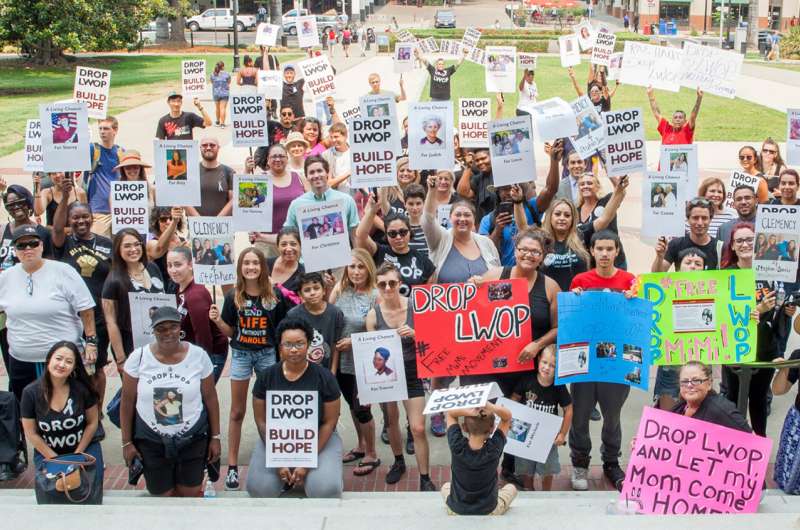This article has been reviewed according to Science X's editorial process and policies. Editors have highlighted the following attributes while ensuring the content's credibility:
fact-checked
trusted source
proofread
New report shows the impact of long-term sentencing in California's women's prisons

More than 4,100 people are currently serving time behind the walls of California's prisons for women. Activist Jayda Rasberry was once one of them.
"What stands out to me the most now is the lack of knowledge anybody going into the system has," Rasberry said in a new report from the University of California Sentencing Project. "And then the lack of knowledge that we're given when we're inside."
Published by the UCLA Center for the Study of Women|Streisand Center, the report presents findings from the project's inaugural study, which focuses on those who went through these prisons and aims to counter the lack of knowledge around their experiences.
Spurred on by those who served time within the California Institution for Women, an interdisciplinary group of faculty, researchers and students from different university campuses partnered with California Coalition for Women Prisoners to take a close look at the conditions and extensive impacts of long-term sentences.
"The project epitomizes the kind of community-led research that the center endeavors to advance," said Grace Hong, the Center for the Study of Women|Streisand Center's director and professor of gender studies at UCLA. "It's based on longstanding, reciprocal organizing relationships between incarcerated and formerly incarcerated people and university researchers—some of whom are themselves system-impacted."
Hong also serves as principal investigator for the project alongside Joseph Hankins, professor of anthropology at UC San Diego.
Hankins and his co-authors emphasized the importance of the research since little has been done about long-term incarceration and its effects, especially on women and trans and non-binary people—while imprisoned and after release. Various state propositions since the 1970s have also drastically changed the special circumstances needed to impose life without the possibility of parole sentences and other harsh sentencing, with more than a hundred enhancements that can be used to maximize and extend punishment.
California has the highest rate of people in women's prisons serving a life sentence, with 1 in 4 sentenced to life without parole. In addition to the California Institution for Women, the state also has the largest women's prison in the world: the Central California Women's Facility in Chowchilla.
In December 2019, the project brought together 22 participants, ranging in age from 29 to 64, for in-depth interviews and group discussions. The majority of collaborators were sentenced as youth to long terms, with 15 entering prison at the age of 25 or younger. Many who participated knew each other; some had not seen each other in decades.
All together, they had already spent more than 300 years behind bars.
In the report, the authors emphasized that sentencing "is not a singular event but a multi-faceted process that involves an array of social processes and state actors." They focused on several themes that were found in the stories and experiences of those currently and formerly incarcerated:
- The criminal legal system's refusal to recognize those sentenced as a victim or survivor, ignoring the defendant's own histories of trauma when charging or sentencing them.
- The many ways that opaque criminal legal procedures led to dehumanization, coercion, neglect and further trauma.
- How sentencing is entangled with larger societal forces and politics, with guilt seemingly predetermined based on race, sex and gender.
- The role that prison and parole authorities play in exacerbating and even further extending sentences and punishment.
- The harm and violence of long-term sentencing that go beyond time served and can inflict a lifetime of trauma that may span generations.
Romarilyn Ralston is executive director of Project Rebound at Cal State Fullerton, which supports formerly incarcerated students as they seek a college education. As a longtime organizer with the California Coalition for Women Prisoners, she participated in peer interviews and a focus group.
She said it felt good to be in community, even while acknowledging she could see how some were still grappling with the trauma of their experiences.
"Formerly incarcerated women are the least served of all incarcerated populations," said Ralston, who spent 25 years in prison. "We don't have the same resources as men available to us during reentry. We survived as best as we could."
She and the other project participants hope to get the report out to as many people as possible, including policymakers and legislators as well as those who work in public health and mental health. Copies of the report are being distributed to partners of the UC Sentencing Project and various organizations that advocate for the rights of those incarcerated and prison abolition.
Future work will include both creative and scholarly efforts that continue to center the voices and experiences of those impacted by long-term sentencing. The report also outlines research questions that could lead to more studies and knowledge to support movements for decarceration and transformative social change.
Jane Dorotik, who helped start the UC Sentencing Project and whose life sentence was only overturned last year, stressed the importance of the project and its work.
"Mass incarceration has been an abysmal failed experiment that has massively harmed our society," she said. "It's time to listen to and learn from those who know the most about these failures."
Provided by University of California, Los Angeles




















